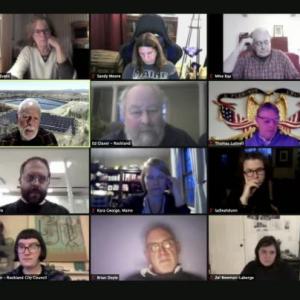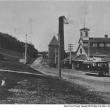In a first-ever gathering, Midcoast municipal leaders advance regional approach to clean energy
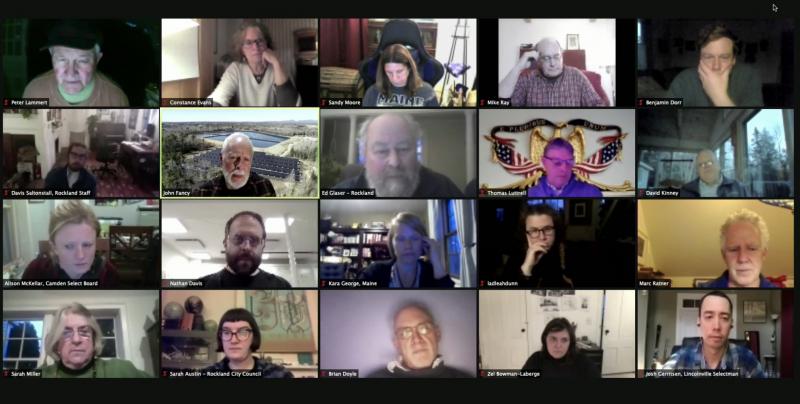 Municipal employees and elected officials gathered
Municipal employees and elected officials gathered
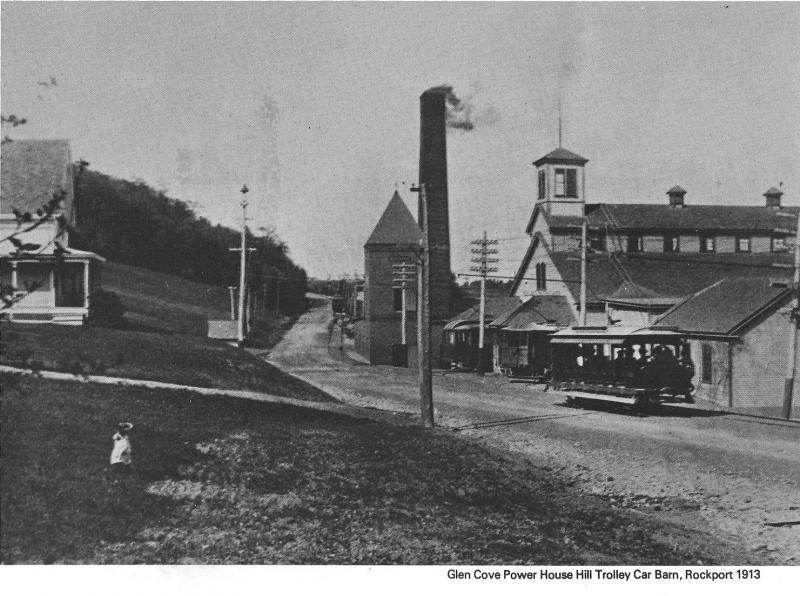 The Rockland, Thomaston and Camden Street Railway, an electric trolley company that produced electricity at the bottom of Power House Hill in Glen Cove, Rockport, sold surplus electricity to customers.
The Rockland, Thomaston and Camden Street Railway, an electric trolley company that produced electricity at the bottom of Power House Hill in Glen Cove, Rockport, sold surplus electricity to customers.
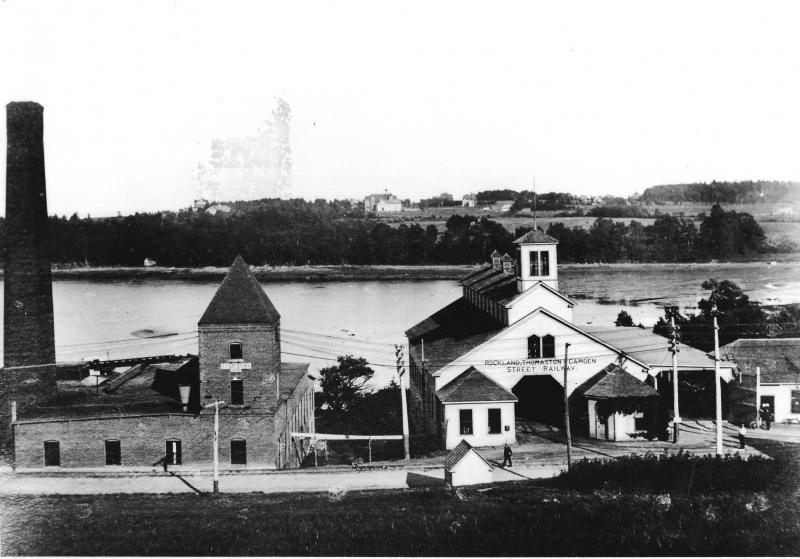 Rockland, Thomaston and Camden Street Railway electrical production facility, barn for trolleys, and company headquarters in Glen Cove, Rockport.
Rockland, Thomaston and Camden Street Railway electrical production facility, barn for trolleys, and company headquarters in Glen Cove, Rockport.
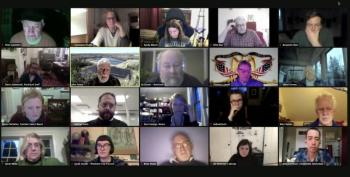 Municipal employees and elected officials gathered
Municipal employees and elected officials gathered
 The Rockland, Thomaston and Camden Street Railway, an electric trolley company that produced electricity at the bottom of Power House Hill in Glen Cove, Rockport, sold surplus electricity to customers.
The Rockland, Thomaston and Camden Street Railway, an electric trolley company that produced electricity at the bottom of Power House Hill in Glen Cove, Rockport, sold surplus electricity to customers.
 Rockland, Thomaston and Camden Street Railway electrical production facility, barn for trolleys, and company headquarters in Glen Cove, Rockport.
Rockland, Thomaston and Camden Street Railway electrical production facility, barn for trolleys, and company headquarters in Glen Cove, Rockport.
MIDCOAST — It may be the result of living in the Zoom Age, when joining a meeting online is easier than driving to another town for yet another meeting, or perhaps it was just time the topic got aired, but the number of Midcoast municipal and county officials logging into a March 23 meeting to focus on clean energy options was considerable.
It was a short meeting, held from 6 to 7:20 p.m., with elected select board members, town and city managers and administrators, city counselors, county commissioners and municipal employees from Thomaston, Rockland, Camden, Lincolnville all there to, ‘get out of their bubble’ as one person characterized it, and relate with other area communities about a common issue — energy efficiencies and innovations.
The meeting had been formally convened by the Rockland City Council, via Zoom, and in addition to Mayor Ed Glaser and Councilors Sarah Austin, Nathan Davis, Benjamin Dorr and Louise Maclellan-Ruf, others attending included:
Peter Lammert, Thomaston Select Board Chair
Constance Evans, Rockland Energy Advisory Council Chair
Sandy Moore, Thomaston Select Board
Mike Ray, Lincolnville Select Board
Davis Saltonstall, Rockland Sustainability Coordinator
John Fancy, Thomaston Pollution Control Director
Tom Lutrell, Rockland City Manager
David Kinney, Lincolnville Town Administrator
Dorothy Meriwether, Knox County Commissioner
Andrew Hart, Knox County Administrator
Josh Gerritsen, Lincolnville Select Board
Zel Bowman Laberge, Thomaston Select Board
Alison McKellar, Camden Select Board
Kara George, Thomaston Town Manager
Mary Costigan, Rockland City Attorney
Ladleah Dunn, Lincolnville Select Board Chair
Marc Ratner, Camden Select Board
Sarah Miller, Camden Energy Committee
Brian Doyle, Thomaston Economic Development Specialist
George Terrien, Rockland Sustainability Committee
Aina Wright, Sierra Club
While no decisions were made, even about scheduling another meeting, there was a low key endorsement of convening again.
There is, said Rockland Councilor Davis, “great benefits to unstructured communication.”
There was also mention of creating an informal energy task force, along the lines of the Midcoast Broadband Coalition, which comprises Camden, Hope, Lincolnville, Northport, Rockland, Rockport, South Thomaston and Thomaston, and whose goal is to, provide residential and businesses in the Midcoast with affordable and high-speed internet.
In addition to delivering brief summations of their own energy efficiency and production projects, such as solar panel arrays in Thomaston and Lincolnville, residential weatherization improvements in Rockland, hybrid police patrol car purchases in Camden, and electric vehicle charging stations installed in Rockland, the discussion moved into newer territory.
George Terrien, who lives in Rockland, suggested exploring a consumer-owned utility, mentioning Sacramento Municipal Utility District, which has been a community-owned, nonprofit electric service for 70 years and has a current goal of eliminating carbon emissions from its power supply by 2030.
“To my knowledge, the program continues successfully, ‘renting’ roof space to install solar panels, and distributing generational benefits, at no cost to the property owner,” said Terrien. “Such an outcome seems at least potentially beneficial in Maine, especially with the combined opportunity to create smart grids and energy storage as technology makes possible.”
Lincolnville Select Board member Josh Gerritsen provided a link to ourpowermaine.org website, which represents an effort to establish the nonprofit Pine Tree Power Company, an electric utility for parts of Maine now served by Central Maine Power and Versant.
He added one more advantage to community-owned utility, that being the collective ownership of power poles, which, “should make it that much easier to deploy broadband.”
Rockland Councilor Sarah Austin spoke of the traditional tiers of government — municipal, county and state — “but some of those are historical artifacts. We’ve got folks here from at least two counties and being able to have regular meetings of this nature where communities with similar needs, even if in different counties, can discuss opportunities for banding together to apply for grants or generate programs or do lobbying at the state or county level might make a lot of sense because we do have common interests.”
Those interests, she said, should not stop at the county line.
Mayor Glaser said the application for a grant to help Rockland install electric vehicles charging platforms could be such an example.
“I bet there are other towns in area applying for same thing,” he said, suggesting a combined regional front could be more effective.
Referencing grant monies, Connie Evans, who sits on the Rockland Sustainability Committee, said, “We also don’t know about everything that is available,” suggesting that collecting knowledge in a regional pool would benefit the Midcoast as a whole.
Terrien responded: “Following up on Connie Evans’ encouragement for cooperation over projects taken on individually but which could benefit from joint consideration: For example, what are the costs and benefits of different ways of instituting solar projects within municipal limits, as in identification of tax benefits, allocation of costs, opportunities for financing, etc.? We could certainly benefit from cooperative analysis.”
He continued: “One way to initiate cooperation would be to propose that any municipality facing a problem/opportunity that could benefit from collaboration would invite others generally, and keep a steering committee to assemble and enlist and disseminate efforts and benefits.”
Rockland Council Nate Davis said one outcome of the meeting could be the possible formation of a regional coalition, “that could meet regularly and have one or more representatives from each town. We could charge them with developing a plan to weatherize every home in the Midcoast. What would that take over the next 25 years? It would be great if we could find a mechanism to do that.”
Austin said she hoped to see, “some sort of baseline entity to be available,” a proactive entity, as opposed to a coalition formed in reaction to a proposed development or event. Which was how this particular meeting originated, following a recent, yet abandoned, proposal by Summit Natural Gas to extend a gas pipeline from Belfast to Rockland.
Rockland City Council Louise Maclellan-Ruf emphasized the need for communication and sharing of knowledge among communities. She specifically mentioned the recent cell tower controversy in Rockland, and noted that, “Camden and Rockport were ahead of the curve.” (Both of those towns had crafted cell tower ordinances in years past.)
“How can we get the information and share that information,” she asked. “It’s paramount with communication that we pay attention what is happening in surrounding towns because it eventually comes to each of our towns.”
Why reinvent the wheel, “if Camden or Rockport or Thomaston or Lincolnville has already answered the question,” she said.
Mayor Glaser illustrated the conversation with a description of the long-gone Rockland, Thomaston and Camden Street Railway, an electric trolley, that provided transportation in the area for 39 years, around the turn of the 20th Century.
The power station was at the base of Power House Hill, at Glen Cove in Rockport, said Glaser.
There, coal was stoked into ovens that turned heat into electricity to drive the trolley cars. Surplus electricity was also sold to customers, and even after the trolleys were put to rest, the company continued to make electricity.
“What we really are talking about, in some ways, is going backwards,” he said. “Maybe it was a better idea back then. Who knows? But history leads in other directions. It can go back to where it came from.”
Going forward, Davis offered a few options, such as establishing a task force to meet once a month, to talk about energy topics, “as well as something even less structure than that; as Ed said, an even more informal social gathering. But I think we can and should do both.”
Rockland Councilor Ben Dorr said: “I think that this is what we are accomplishing here is indicative of the fact that we are able to do exactly this.Which is just formally invite one another to things that we think we should be participating on together. And it is a lot easier to do when the walls aren’t as big as we perhaps make them out to be. Who knows what will come of this, whether it is trying to save the world over a beer or if it’s an energy committee. If anything, we have proven to ourselves that we are capable of getting together and having a civil conversation about one of any number of issues.”
In the end, there was no definitive schedule for another meeting, but a quiet agreement that such a gathering happens again.
Reach Editorial Director Lynda Clancy at lyndaclancy@penbaypilot.com; 207-706-6657
Event Date
Address
United States

